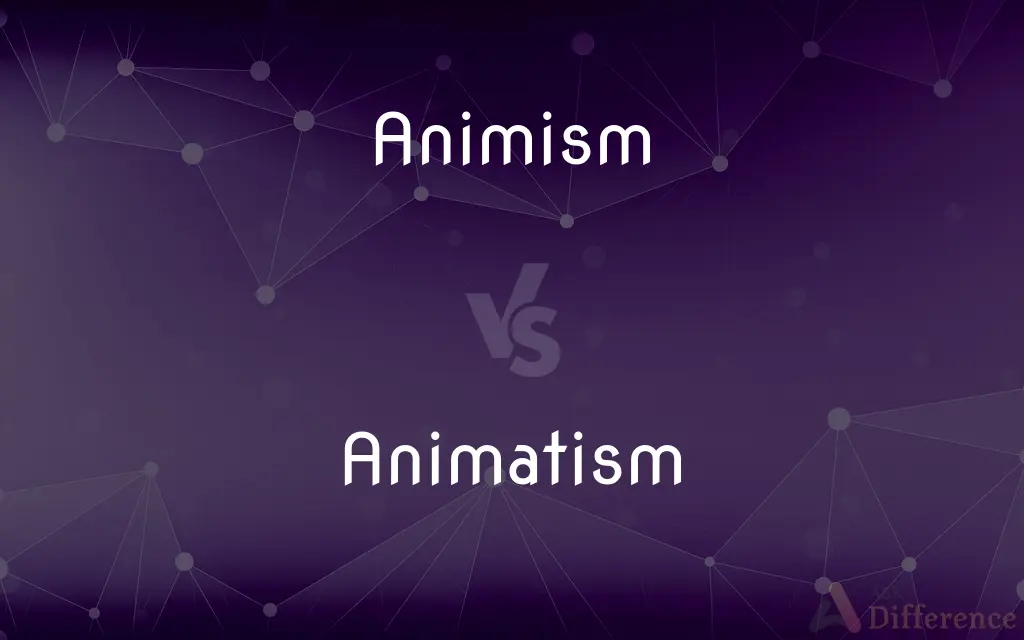Animism vs. Animatism — What's the Difference?
Animism attributes spiritual essence to entities and natural phenomena, whereas animatism perceives the world as inhabited by impersonal spiritual powers.

Difference Between Animism and Animatism
Table of Contents
ADVERTISEMENT
Key Differences
Animism is a belief system that sees a spiritual essence in all living and non-living entities, suggesting a world where everything has a soul. Whereas animatism focuses on the belief in a supernatural power or powers that reside in objects or people but are not personified as spirits.
Animism often involves rituals and practices aimed at communicating or appeasing the spirits within objects or natural phenomena. On the other hand, animatism may involve rituals to harness or protect oneself from the impersonal powers, without necessarily communicating with them as entities.
In animism, the spiritual essence of entities leads to a rich mythology of gods, spirits, and ancestor worship, creating a complex web of relationships between humans and the spirit world. Whereas animatism tends to have a more simplified cosmology, focusing on the power itself rather than the personalities behind it.
Animistic belief systems usually include a wide range of spirits associated with natural features, animals, or ancestors, emphasizing the interconnectedness of all things. In contrast, animatism might concentrate on a few significant powers that influence human affairs, such as luck, mana, or the evil eye.
Animism can be found in many indigenous and traditional societies around the world, often forming the foundation of their spiritual and social lives. Meanwhile, animatism can appear in both indigenous cultures and more developed societies, acting as a complementary belief system to organized religions or existing alongside them.
ADVERTISEMENT
Comparison Chart
Definition
Belief in spiritual essence in all entities
Belief in impersonal spiritual powers
Focus
Spirits within objects and phenomena
Supernatural powers without personalization
Rituals and Practices
Aimed at communication with or appeasement of spirits
Aimed at harnessing or protection from powers
Mythology and Cosmology
Rich, with many gods and spirits
Simplified, focusing on powers
Prevalence
Indigenous and traditional societies worldwide
Both indigenous and developed societies
Compare with Definitions
Animism
The belief that all natural phenomena, objects, and the universe itself possess souls.
Animism regards trees and rivers as being endowed with spirits.
Animatism
The belief in a supernatural power that energizes the universe and living beings without personal form.
Animatism considers the concept of mana as a universal force.
Animism
The perspective that the world is animated by spiritual forces.
Animism interprets dreams as messages from the spirit world.
Animatism
A religious perspective focusing on impersonal forces rather than individual spirits.
In animatism, charms are used to attract positive energy and repel negative forces.
Animism
A worldview where spirits are a key aspect of the natural environment and human life.
In animism, rituals to honor the spirits of ancestors are common.
Animatism
A system where magic and supernatural forces are understood as impersonal.
Animatism involves using symbols or objects to channel cosmic forces.
Animism
A religious belief that spiritual beings, or souls, exist in animals, plants, and other entities.
Animism often involves prayers or offerings to the spirit of the earth.
Animatism
The theory that power or influence, rather than spirits, governs the natural world.
Animatism might involve rituals to enhance one's personal power.
Animism
The practice of attributing a living soul to inanimate objects and natural phenomena.
Animism sees a rock or a waterfall as alive, possessing its own spirit.
Animatism
The belief in an unseen power that can cause change in the physical world.
Animatism attributes success in hunting not to spirits but to possessing the right power.
Animism
Animism (from Latin: anima, 'breath, spirit, life') is the belief that objects, places, and creatures all possess a distinct spiritual essence. Potentially, animism perceives all things—animals, plants, rocks, rivers, weather systems, human handiwork, and perhaps even words—as animated and alive.
Animatism
Animatism is a term coined by British anthropologist Robert Marett in the context of his teleological theory of the evolution of religion. It refers to "a belief in a generalized, impersonal power over which people have some measure of control".
Animism
The belief in the existence of individual spirits that inhabit natural objects and phenomena.
Animatism
A belief that all animate and inanimate objects are infused with a common life force.
Animism
The belief in the existence of spiritual beings that are separable or separate from bodies.
Animatism
(anthropology) The belief that everything is pervaded with a life-force giving each inanimate object a consciousness or personality, but not a soul as in animism.
Animism
The hypothesis holding that an immaterial force animates the universe.
Animatism
The attribution of consciousness and personality to natural phenomena such as thunderstorms and earthquakes and to objects such as plants and stones
Animism
A belief that spirits inhabit some or all classes of natural objects or phenomena.
Animism
A belief that an immaterial force animates the universe.
Animism
(dated) A doctrine that animal life is produced by an immaterial spirit.
Animism
The doctrine, taught by Stahl, that the soul is the proper principle of life and development in the body.
Animism
The belief that inanimate objects and the phenomena of nature are endowed with personal life or a living soul; also, in an extended sense, the belief in the existence of soul or spirit apart from matter.
Animism
The doctrine that all natural objects and the universe itself have souls;
Animism is common among primitive peoples
Common Curiosities
Is animism considered a form of religion?
Yes, animism is considered a type of religion or spiritual belief system that involves worship, rituals, and mythology centered around spirits.
Are there specific rituals associated with animism and animatism?
Yes, animism often includes rituals to communicate with spirits, whereas animatism involves practices to harness or protect from supernatural powers.
Do modern societies practice animism or animatism?
Elements of both can be found in modern societies, often integrated into folk beliefs or coexisting with more dominant religions.
What is the main difference between animism and animatism?
Animism involves belief in spirits residing in objects or natural phenomena, while animatism focuses on impersonal spiritual powers.
Can animism and animatism coexist in the same culture?
Yes, both belief systems can coexist, with animism providing a structure for personal spirits and animatism focusing on the broader, impersonal powers.
How do animism and animatism approach the concept of the supernatural?
Animism personifies the supernatural in spirits, while animatism conceptualizes it as an impersonal force or power.
How do animism and animatism differ in their historical contexts?
Both have ancient origins, but animism is often associated with the earliest forms of spiritual belief, while animatism can develop in both primitive and more complex societies.
How does animatism explain phenomena like luck or misfortune?
Animatism may attribute such phenomena to the influence of impersonal forces or powers that humans can attempt to influence through rituals.
What impact do animism and animatism have on society?
They influence cultural practices, rituals, and the social structure, shaping how communities interact with the natural world and understand the supernatural.
What kinds of entities are believed to have spirits in animism?
In animism, entities ranging from natural elements (like rivers and trees) to objects and animals are believed to possess spirits.
What is the significance of rituals in animism and animatism?
Rituals are crucial in both for establishing and maintaining a connection with the spiritual or supernatural forces they believe in.
Can animatism be found in major world religions?
Elements of animatism, such as the belief in sacred power, can be found within the practices or beliefs of major world religions.
How do animism and animatism view the role of humans in the universe?
Animism sees humans as part of a community that includes spirits, while animatism views humans as subjects to impersonal forces that they can influence.
How do animistic beliefs influence environmental attitudes?
Animism often fosters a respect for nature, seeing it as inhabited by spirits, which can lead to environmental conservation efforts.
Does animatism involve a belief in gods or deities?
Animatism typically focuses on impersonal forces rather than deities, although it may coexist with beliefs in gods in some cultures.
Share Your Discovery

Previous Comparison
Page vs. Squire
Next Comparison
Poblano vs. Jalapeno















































